A Proven Therapeutic Approach
Evolve’s therapeutic approach is evidence-based and behavioral. In our standard clinical model, we provide psychiatry, a strong DBT skills-training component, along with other evidence-based treatments such as Cognitive Behavioral Therapy (CBT), Motivational Interviewing, and others. The combination of therapeutic approaches in each treatment plan depends on the adolescent’s specific needs in treatment. We also offer experiential therapies such as equine-assisted therapy, art therapy, music therapy, yoga, fitness, hiking, and more. Experiential activities provide fun, healthy outlets for teens, expose them to new ways of expressing themselves, and help them discover what a “life worth living” looks like for them.
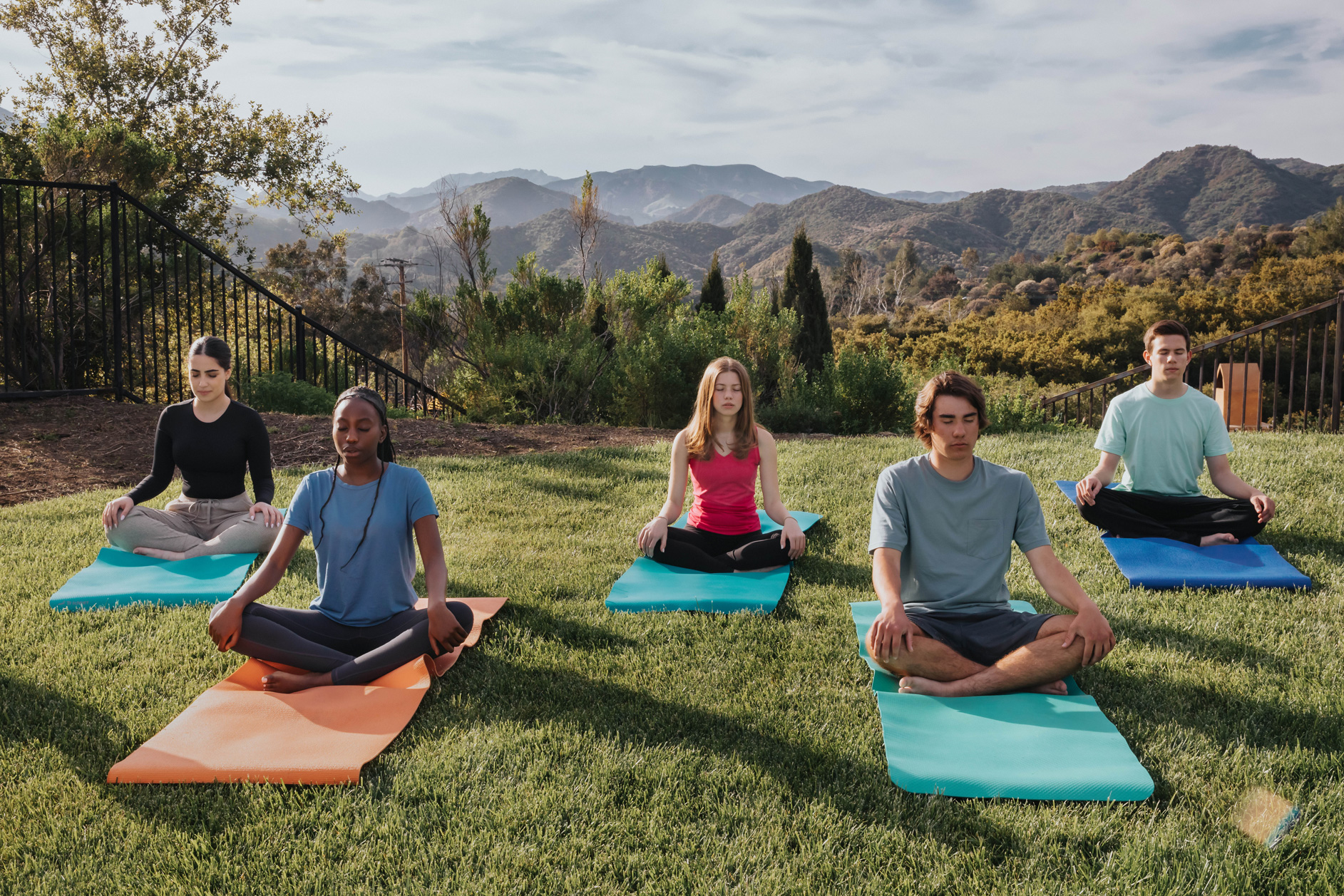
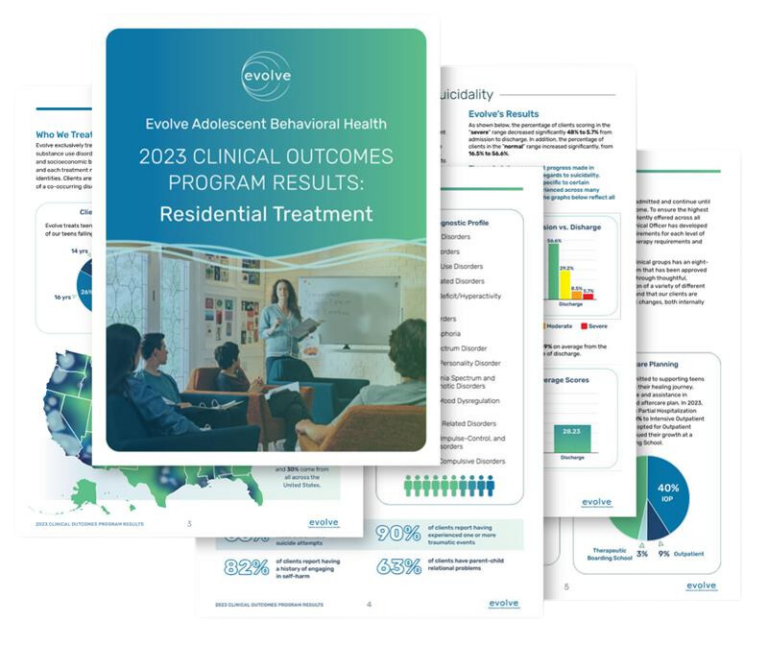
Download Our 2023 Outcomes Report
Revolutionizing Treatment Outcomes with Clinical Data
Since launch, Evolve’s teams have diligently collected outcomes data across clinical domains like depression, suicidality, anxiety, substance use, ADHD, ODD, and Conduct Disorder, demonstrating our programs' positive impact on teen mental health and recovery.
Evolve provides a safe and structured environment where teens develop valuable skills and insights, ensuring gains in treatment are maintained long after discharge.

Dialectical Behavior Therapy (DBT)
Dialectical behavior therapy (DBT) is an evidence-based, highly effective treatment modality that treats emotional dysregulation, self-harming behavior, suicidal ideation, and other mental health and/or behavioral issues. DBT is a structured, skills-based approach designed for individuals with intense emotions, strained relations and impulsive behaviors, and helps people change their ineffective behavior patterns.
While many treatment centers report that they use DBT in their programming, Evolve is unique in that great care is taken to facilitate these components of the treatment in a way that adheres to the structure and philosophies developed by Marsha Linehan, the creator of DBT.
In addition to Evolve’s standard clinical model programs with DBT Skills Training, Evolve offers comprehensive DBT residential programs.
Cognitive Behavioral Therapy (CBT)
Cognitive Behavioral Therapy (CBT) is an evidence-based treatment that has shown to be effective at treating depression, anxiety, substance use disorders, and eating disorders. It is based on the belief that these problems are caused by unhelpful ways of thinking and behaving, and that treatment should involve changing these unhelpful thinking and behavioral patterns. In essence, once an individual starts to think about themselves and the world differently, they will then start to feel and act differently as well. For example, a client utilizing CBT for social anxiety would need to challenge negative assumptions about what others are thinking of them while also challenging themselves to not avoiding social situations. Over time, they will start to feel less anxious in social situations as a result.


Motivational Interviewing (MI)
It is not uncommon for teens to feel unsure about changing their behaviors that others find problematic. After all, the behaviors may serve an important function for them (mood regulation, managing distress, etc.) or they might just find them fun (drug and alcohol use). The goal of Motivational Interviewing (MI) is to understand a client’s personal goals and priorities in life and help them find their own motivation to change. This involves patience and “meeting them where they are at,” which is very significant for teen clients who may feel like they don’t have any control over their lives. Because internal motivation for change is such an important component of therapy and entering recovery, MI is considered an evidence-based treatment for substance use disorder.
Family Therapy & Support
All clients participate in weekly family therapy, typically with their parents and/or other familial caregivers. While there are many approaches to family therapy, our therapists typically take a solution-focused, skills-based approach. Since learning effective coping skills is a key part of treatment for teens at Evolve, the clinical teams ensure that parents are learning many of these skills alongside their teens and that the skills are practiced during family therapy sessions. Our therapists also provide psychoeducation and coaching to parents to help them better understand what their teen is going through and how they can help.
Families Can Expect The Following:
- Family Therapy
- Parent Support Group
- Parent Coaching
- Aftercare Planning
- Multi-Family Group (IOP Only)
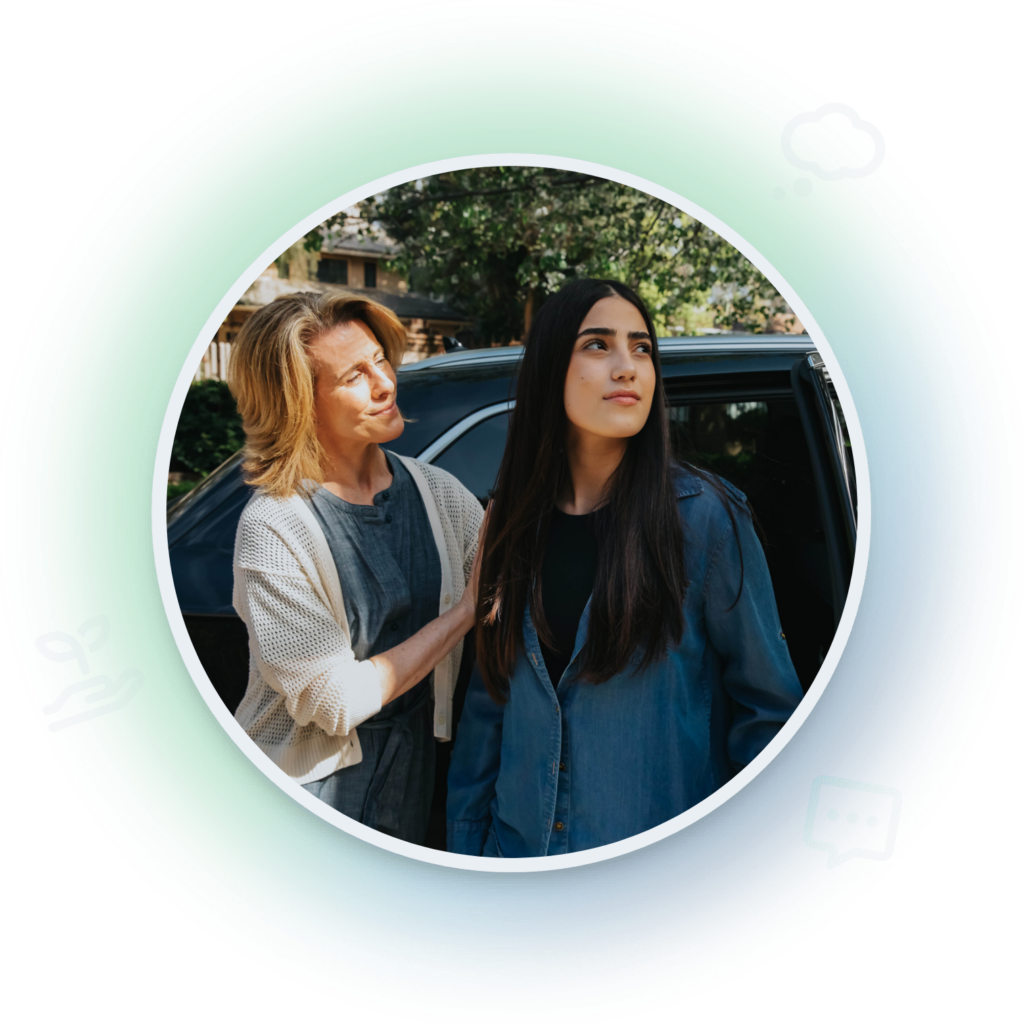
Group Therapy at Evolve
Group Therapy is a powerful therapeutic tool at all levels of treatment. During group sessions, therapists help adolescents develop and explore interpersonal relationships and work on specific treatment goals. At Evolve, teens participate in several group sessions per day. Check out our list of group therapies below.
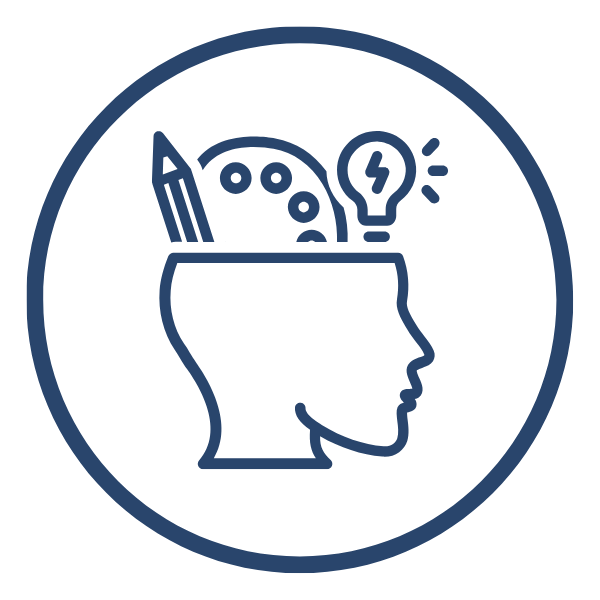
DBT Skills Training
Each Evolve programs include weekly DBT skills training groups that focus on each of the four skills training modules: Core Mindfulness, Interpersonal Effectiveness, Emotion Regulation, and Distress Tolerance. Research supports the use of adherent DBT skills training on its own as an effective intervention for reducing emotion dysregulation, self-harm, suicidal behaviors, and other challenges our teen clients face. All DBT skills groups are facilitated as designed by Marsha Linehan, the developer of DBT, which means that they stick to the following format:
1. Mindfulness practice
2. Homework review
3. New skill lesson
4. Assign new skill practice homework
5. Check-out

Diary Cards
Evolve’s programs have a 30-minute Diary Card Group that occurs every morning. The goal of the Diary Card Group is to give clients an opportunity to reflect and fill out their cards for the previous day. The Diary Card is an essential part of treatment and a helpful way to track treatment progress and outcomes. Each teen uses their cards to increase mindfulness of both ineffective and skillful behavior, as well as track their emotions and urges. Each teens Diary Card is edited by the Therapist, as needed, to reflect the individual’s target behaviors, such as the intensity of suicidal ideation and self-harm urges. Teens are given new cards each Monday and the completed cards are given to the Therapist.
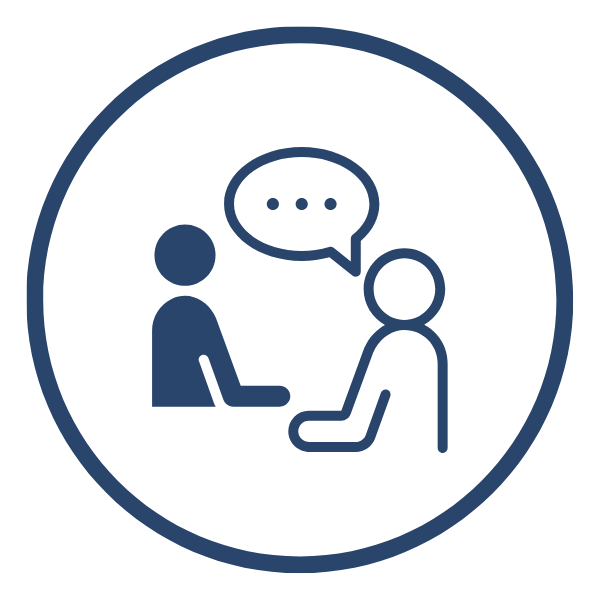
Cognitive Behavioral Therapy
Cognitive Behavioral Therapy (CBT) is an evidence-based treatment that has shown to be effective at treating depression, anxiety, substance use disorders, and eating disorders. In CBT group teens focus on making connections between thoughts, feelings and actions. It is based on the belief that when negative thought patterns are identified and adjusted, positive changes in feelings and behavior can take place. The therapist follows group curriculum that covers negative thought logs, the cognitive triangle, techniques for automatic negative thoughts, core beliefs, and more.

Smart Recovery
SMART Recovery (Self-Management and Recovery Training) is a science-based program aimed at helping individuals overcome addictive behaviors. Unlike the traditional 12-Step model, which emphasizes lifelong sobriety, SMART Recovery focuses on harm reduction and self-empowerment, allowing participants to set personal goals and take control of their recovery. Rooted in cognitive-behavioral therapy (CBT), these groups help teens understand the connection between thoughts, feelings, and actions. By learning how to manage these, teens can make better choices, cope with challenges, and ultimately, reduce the harmful behaviors that have been holding them back. SMART Recovery fits the needs and mindsets of today’s teens. By empowering teens to make positive changes and providing them with the tools they need, this group offers a flexible approach to lasting recovery.
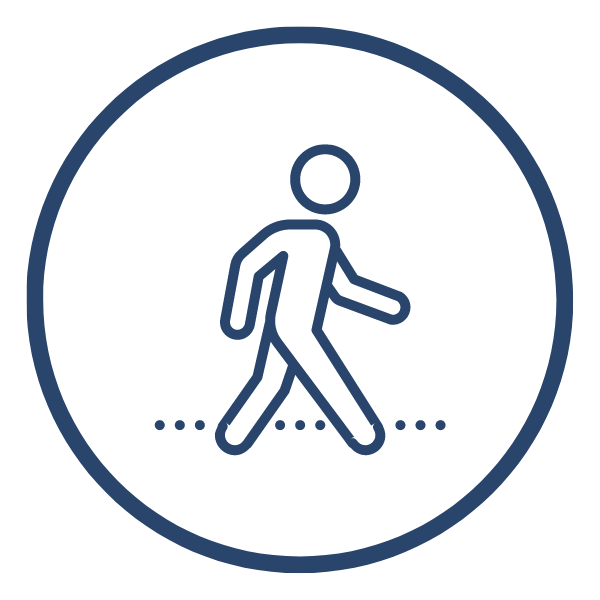
Seeking Safety
Trauma and substance use often go hand-in-hand. After a traumatic experience, many people choose unhealthy coping mechanisms, such as substance use, to escape their pain. Seeking Safety, a relatively recent evidence-based treatment model that treats co-occurring post-traumatic stress disorder and substance use disorder, helps our teens recover from their traumatic past so they can regain the footing they need to move forward in life. Through the structured group curriculum, teens work towards safety in their relationships, thinking, behavior, and emotions.
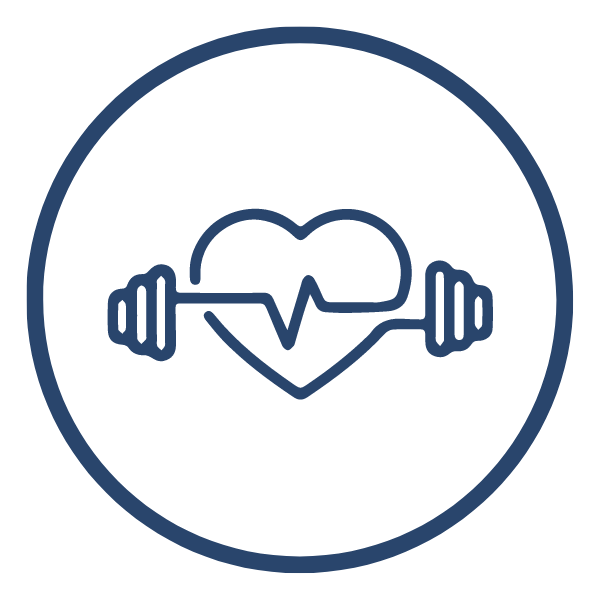
Relapse Prevention
Relapse Prevention Therapy is a type of cognitive-behavioral therapy. It primarily treats addiction and substance use but also is effective for depression, self-harm, OCD, and other mental health disorders. For clients without a history of substance use, relapse prevention strategies are also used to address relapse on other problem behaviors, such as self-harm, food restriction, etc. This group helps teens limit relapses by teaching them how to anticipate, identify, and cope with triggering situations that can lead to relapse. In the group environment, teens can encourage and gain confidence from each other’s recovery journeys.
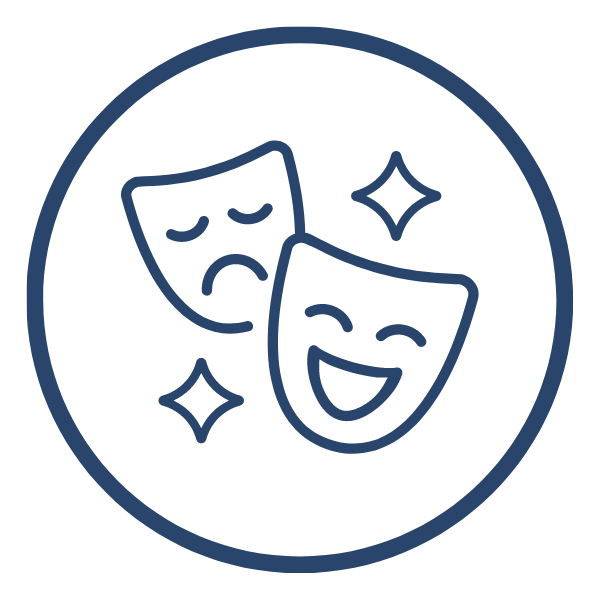
Anger Management
Many of our clients struggle with anger and lack the proper tools to manage these difficult emotions. For some teens, anger can result in verbal or physical aggression as well as intense conflict with family and peers. Anger Management group is a skills-based group designed to help client identify triggers for angers, identify physical manifestations of anger, and gain skills to decrease feelings of anger. Communication skills including conflict resolution and communication styles are also taught through role play and role modeling by group facilitators.

Healthy Relationships
Healthy Relationships group helps teens through the process of learning how to identify and cultivate healthy relationships in many different areas of their lives. This is a skill-based group which aims to equip teens with skills to more effectively identify, build, and strengthen positive relationships. In group, teens learn how to define friendship, set and observe limits in relationships, navigate romantic relationships safely, understand love languages, and much more.
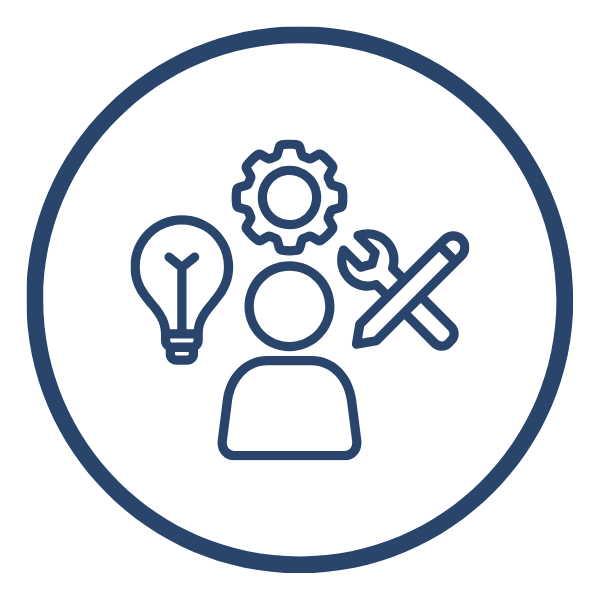
Life Skills
Life Skills group aims to introduce teens to some of the concepts that are crucial to living successfully as an adult. These skills are taught through informative videos, worksheets, role playing and interactive activities. Some of the topics discussed include navigating the internet and social media safely, self-care, time management, goal setting, budgeting and money management, and applying and interviewing for jobs. Life Skills groups at Evolve provide guidance on all these in a way that is hands-on and applicable to today’s generation of teens. Discussion and education around how to navigate the internet and social media safely is also incorporated.

Communcation
The Communication Group helps teens build practical skills for effective communication and interpersonal success. It provides psychoeducation on expressing thoughts and feelings clearly while nurturing healthy relationships. Teens participate in interactive activities such as role-playing “I feel” statements, distinguishing between passive, aggressive, and assertive communication styles, and practicing DBT skills like DEARMAN (making effective requests), GIVE (strengthening relationships), FAST (maintaining self-respect), and THINK (resolving conflicts thoughtfully). Through guided practice and constructive feedback, teens gain confidence in navigating social interactions, advocating for their needs, and creating meaningful connections.
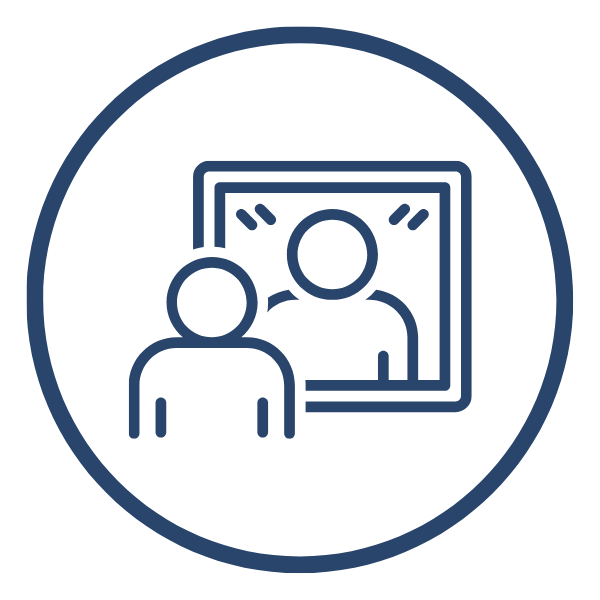
Self-Esteem
Self-Esteem Group is designed to help teens understand and strengthen their sense of self-worth. This group provides psychoeducation on the concept of self-esteem, guiding teens to understand its impact on their thoughts, feelings, and behaviors. The focus is on reducing negative self-perceptions and fostering positive self-views through nonjudgment and self-acceptance. Group sessions focus on practical skills, including adopting a nonjudgmental stance, practicing self-acceptance, building mastery, and setting achievable goals. Teens engage in interactive exercises and discussions that encourage personal growth, resilience, and a deeper appreciation for their unique strengths.

Coping Ahead
The goal of Cope Ahead Group is to help teens identify potential triggers and challenging situations while developing a plan to respond skillfully. Teens practice applying the DBT Cope Ahead skill to potential scenarios outside of treatment such as returning to school, being offered substances at home, hearing “no” from parents, or encountering trauma cues. Through guided practice, role-playing, and constructive feedback, teens develop the ability to anticipate triggers, visualize successful outcomes, and rehearse coping skills.
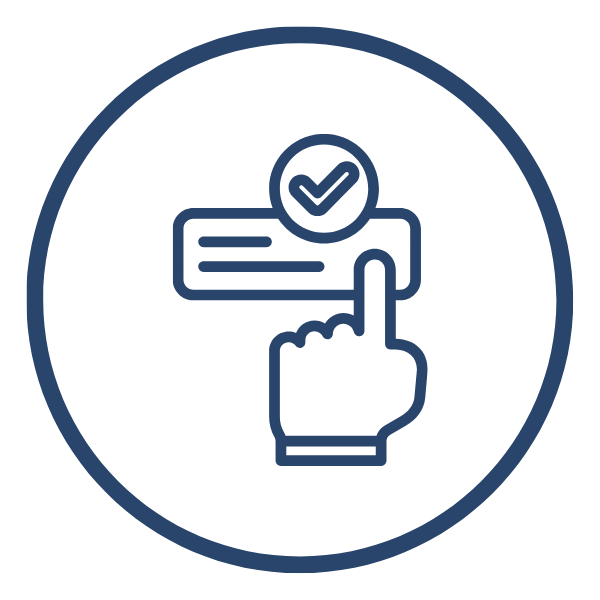
Skills Application
Skills Application Group focuses on strengthening the DBT skills teens learn in their weekly Skills Groups by providing opportunities for hands-on practice and reinforcement. The goal is to help teens build confidence and experience in applying these skills in real-life situations. In this group, teens engage in activities like writing DEARMAN scripts and rehearsing their delivery, role-playing skits to practice GIVE and FAST skills, and creating Cope Ahead plans with imagined rehearsals of their strategies. Through behavioral rehearsal, role-play, and supportive feedback, teens enhance their ability to use DBT skills effectively, preparing them to apply skills with ease and success in their day-to-day life.

Behavioral Activation
This group teaches teens the principles of Behavioral Activation through psychoeducation and skill-building. Behavioral Activation is a CBT skill that focuses specifically on how behaviors can change emotions. It encourages teens to participate in activities that produce positive emotions and to accomplish small, meaningful tasks on a regular basis. Research shows that engaging in pleasant and mastery-building activities increases positive emotions and reduces the sadness associated with depression.
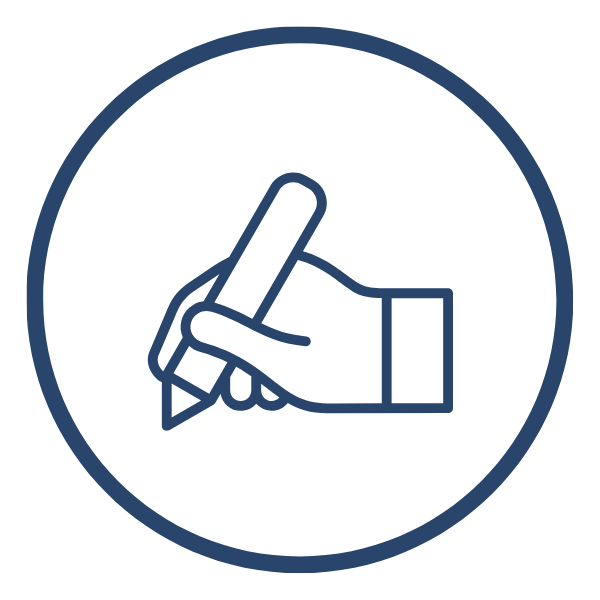
Creative Writing
Creative Writing Group provides teens a space to explore mental health, growth, and recovery through creative expression. Activities include poetry, one-word prompts, short stories, and reflective exercises like the “miracle question.” This group encourages self-expression, builds confidence, and fosters connection, helping teens process emotions and navigate their journey toward healing and personal growth.
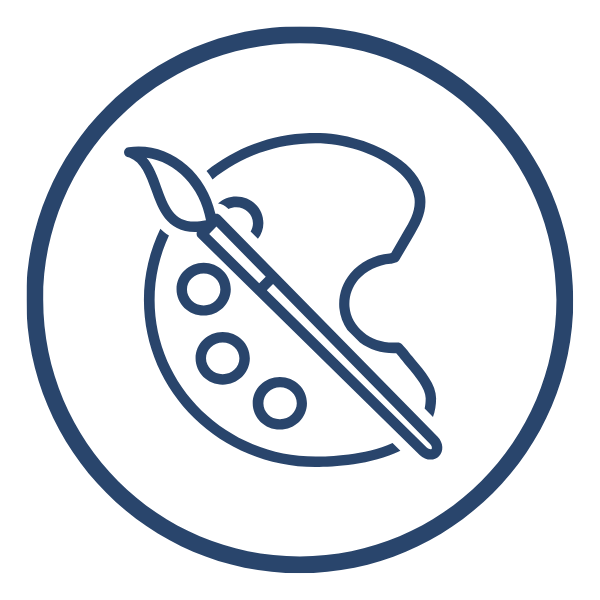
Therapeutic Art
Therapeutic Art Group engages teens in creative activities that explore therapeutic themes, such as self-acceptance, identity, Life Worth Living goals, and understanding emotions. Sessions include projects such as painting, illustrations, collages, and vision boards, allowing teens to express themselves and reflect on their personal growth. This group fosters self-discovery, emotional exploration, and connection through a variety of art mediums.
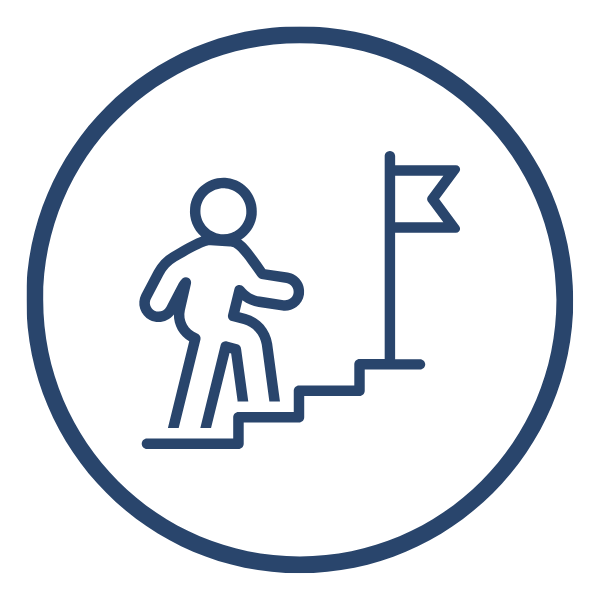
Seven Challenges
Seven Challenges Group supports teens in navigating early recovery from substance use and addictive behaviors using the Seven Challenges Manual and Activity Book. Through guided discussions and interactive activities, participants explore their choices, build self-awareness, and develop skills to support their recovery journey.

Self-Identity
The Self-Identity Group encourages teens to explore who they are by examining their values, priorities, and cultural influences, including family, race/ethnicity, community, sexual identity, and gender identity. Activities such as the Gender Identity Gingerbread Person, The Book of Me, and genograms help participants reflect on their unique experiences and develop a deeper understanding of themselves in a supportive environment.
Experiential Therapies
At Evolve, we believe incorporating experiential therapies and mindfulness practices helps teens increase self-awareness, practice skills, and explore new ways of expressing themselves. We want teens to have fun and discover their version of a life worth living. Each Evolve location offers some but not all of the Experiential therapies listed below. Please contact an Admissions Coordinator to learn more about the experiential groups offered at a specific location.

Equine-Assisted Therapy
Horses have a unique sensitivity to human emotions, which makes equine therapy an effective and widely accepted therapeutic tool, especially for adolescents. Teens can address and break down barriers and resistance toward the therapeutic process through their connection with these majestic, powerful, and loving animals. Through their interactions with horses, adolescents develop caring and nurturing behaviors. They also uncover aspects of themselves previously inaccessible in their relationships with peers, family, and society. Teens are required to be fully present, watch for and respond to subtle signals on multiple levels, and solve problems in the moment in ways that trigger deep learning and emotional maturation. Equine therapists use horses in this context to guide and support positive change. Our equine specialists hold certifications in the use of horses in a therapeutic setting and specialize in working with teenagers with substance use and mental health issues. Equine therapists are present during the therapeutic process and work collaboratively with our clinical team in the development and implementation of the individual treatment plan.

Art Therapy
We use art therapy with clients because it is a safe, non-threatening and mostly non-verbal outlet for expressing what is inside. Art therapy is used to help clients communicate, overcome stress, and explore different aspects of their personalities. In general, art therapy integrates psychotherapeutic techniques with the creative process to improve mental health and well-being. We believe that the creative process involved in artistic self-expression helps adolescents to resolve conflicts and problems, develop interpersonal skills, manage behavior, reduce stress, increase self- esteem and self-awareness, and achieve insight.

Music & Dance
It’s no secret that most teens love music and dancing. Expressive therapies like these improve self-understanding and teach productive ways to cope with uncomfortable feelings. Singing along with a song provides a healthy context to release painful or difficult emotions. Discussing song lyrics can help an angry adolescent articulate the tangled knot of angst they feel inside. Our therapists aren’t afraid of delving into genres like rock, punk, rap, or metal to meet teens where they are and where they feel comfortable. Playing music has a magical way of simultaneously soothing and releasing emotions. Teens benefit from all the therapeutic positives of music therapy, learn to transform their experiences into art, and feel the satisfaction and sense of accomplishment that comes with creating something from beginning to end. Dance, like music, has an amazing capacity to unite mind, body, and soul in a single moment of pure joy and self-expression. Dance and movement therapy help our teens express feelings and tell stories while boosting self-esteem and increasing self-awareness and understanding. Research shows dance therapy can increase general wellbeing, positive mood, and body image.

Drama Therapy
In drama therapy, teens participate in improv, storytelling, theater games, group dynamic games, or role-play exercises that help them learn empathy, self-confidence, and relationship/communication skills. The process of acting out a specific role during drama therapy can be cathartic and trigger real change in a teen. It can help adolescents solve problems and explore their personal feelings about a specific issue that’s bothering them.
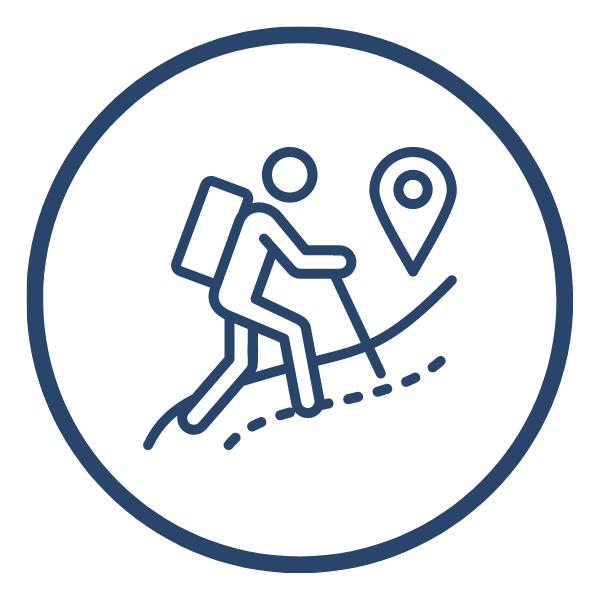
Hiking
Therapeutic hiking groups provide clients a unique opportunity to connect with nature. Nature hikes provide opportunities to develop a new self-image, a new way of relating to others and the environment, and new ways to respond to the challenges of daily life.

Yoga
Adolescents experiencing emotionally charged and racing thoughts need additional help learning how to slow down and regulate their thinking. We use yoga and meditation to help clients become calm and centered, internally. Clients are led in yoga and meditation groups with a highly experienced instructor as part of their regular exercise program.

Surfing
At our Southern California residential homes our surfing program is all about taking therapy into nature. The National Surf School and Instructors Association accredits our surf instructors, who specialize in using surfing as a therapeutic tool and transformative experience. Surfing helps teens practice skills, learn stress management techniques, increase gross motor skills, execute functioning skills, practice mindfulness, and develop spatial awareness, all while having fun and learning a new skill.
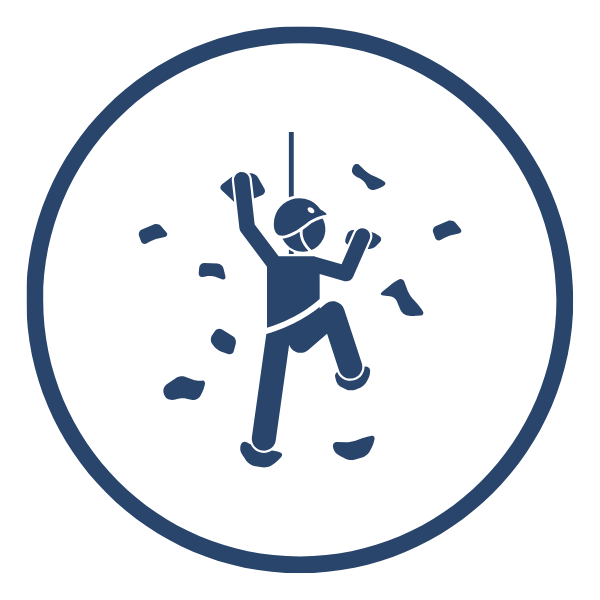
Indoor Rock Climbing
Indoor rock climbing offers teens at our Northern California residential homes a therapeutic activity to build confidence, resilience, and problem-solving skills. As they navigate climbing challenges, teens learn to manage anxiety, trust themselves and others, and set achievable goals. This engaging physical activity promotes both mental and emotional growth in a supportive, fun environment.
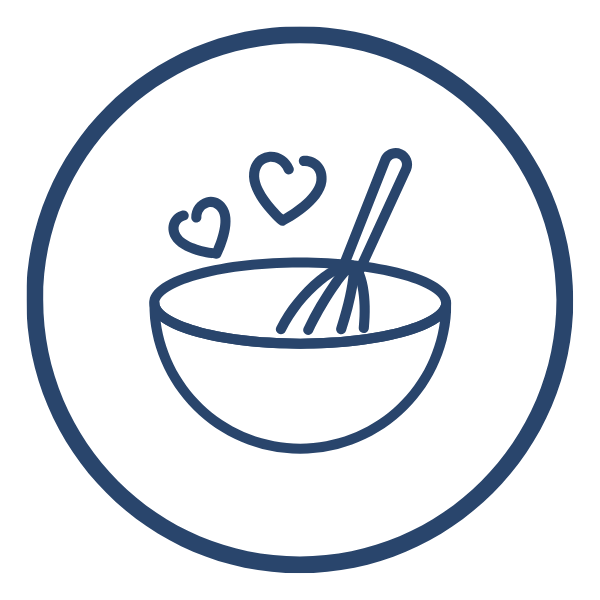
Cooking Lab
Cooking Lab is led by one of Evolve’s chefs and provides teens with opportunities to accumulate positive experiences through cooking and baking. In this group, teens learn basic food preparation techniques, how to follow recipes, and how to create balanced meals. While teens accumulate positive experiences and build life skills, the group reinforces DBT PLEASE skills by highlighting the importance of self-care through proper nutrition.
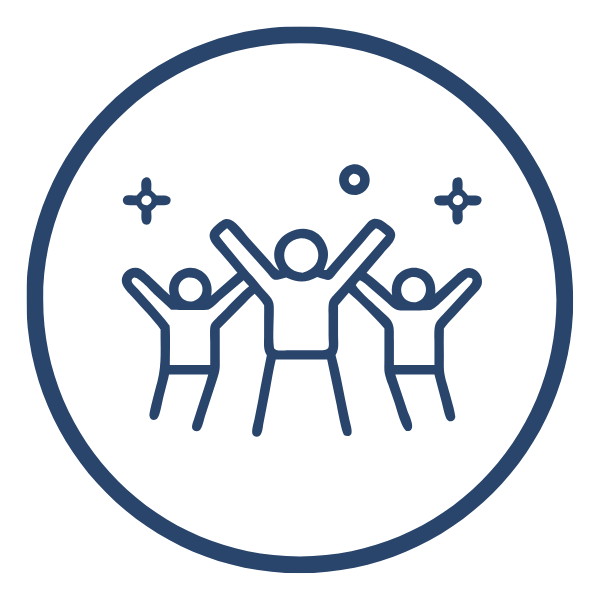
Applied Behavioral Activation
In Applied Behavioral Activation Group at Evolve, teens put the concepts learned in the Behavioral Activation Group into action by practicing the skills in real-world scenarios and group settings. The focus is on integrating these strategies into daily life while building awareness and resilience. Teens practice mindfulness by observing their current emotions, thoughts, and body sensations before, during, and after engaging in the group activity. These activities may include team games, group sports, yoga, or interactive activities like Just Dance. With structured support and feedback, teens gain confidence in using these skills and integrating them into daily life.

Physical Fitness
We show adolescents that living a healthy and well-balanced life can be fun. Every Evolve residential treatment center is equipped with gym facilities that our teens can use when they have downtime or free time. Physical activity is built into the schedule every day. Our goal is to offer our teens the option of making healthy, life-sustaining choices, and teach them that regular exercise is an important part of stress management and emotional stability. Through exercise, teens can develop coping skills and find healthy outlets in their lives that are productive. In treatment, this enhances recovery and limits the rates of relapse. Exercise has a huge effect on a teen’s emotional wellbeing and mood, and even improves cognition. It also has a host of physical benefits: it increases heart rate, reduces stress, improves sleep, lowers blood pressure, and increases energy.

Outings
We take weekly trips to the beach, movies, special hiking trails, museums, miniature golf courses, and more. If we think an activity is appropriate and beneficial, we include it as a special bonus for hard work and achievement. We use outings to model how to experience the world without the use of addictive substances, how to interact with society in enriching and sustaining ways, to enjoy the benefits of nature, and for the same reason everyone else in the world does – to get out and about, have fun, and shake up the regular routine.




























































